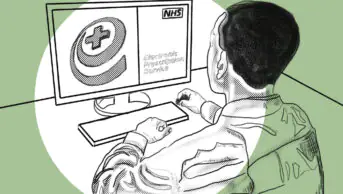The link between government policy and scientific evidence is currently under intense scrutiny.
Evidence sessions from leading scientists given as part of the ongoing COVID-19 inquiry suggest a lack of regard among ministers for scientific data that should have informed policy decisions.
It is an attitude that is reflected in a year-long investigation by The Pharmaceutical Journal into the NHS roll out of inclisiran, a cholesterol-lowering medicine.
When the government announced in January 2020 that it had struck a deal with Novartis to offer inclisiran on the NHS, the press release made a compelling claim.
If the drug were to be given to 300,000 people each year, the Department of Health and Social Care (DHSC) said “it could help prevent 55,000 heart attacks and strokes, and has the potential of saving 30,000 lives in the next 10 years”.
For the UK, where heart disease is one of the leading causes of death and where heart attacks account for around 100,000 hospital admissions each year, the claim presented a convincing argument in favour of a drug that, at the time, had yet to be approved by the National Institute for Health and Care Excellence (NICE). Not only would inclisiran halve low-density lipoprotein cholesterol in just two weeks, but the figures also suggested it could halve the number of hospital admissions for heart attacks and make a significant contribution towards the ‘NHS Long Term Plan’ target of preventing 150,000 cardiovascular deaths over 10 years.
The British Heart Foundation welcomed the announcement as “good news for patients and UK science as a whole”. But questions remain around the veracity of claims regarding the number of lives that inclisiran has the potential to save.
Questions were immediately raised by experts and clinicians following the announcement in January 2020. “Whether it will save 30,000 lives depends on many factors,” said Riyaz Patel, consultant cardiologist and clinical lead for the CVD prevention service at Barts Health NHS Trust, at the time. “It is an estimate based on extrapolation from existing data with multiple assumptions. The trials for example included only specific patients (high risk or with known heart disease), and typically not everyone may be eligible to get the drug as there will be exclusions.”
A letter to the editor of the British Medical Journal, published in January 2020, also warned that the claim that inclisiran could save 30,000 lives in a decade “seems overhyped”. Robert Michell, emeritus professor of biochemistry at the University of Birmingham, said: “However optimistically we interpret ‘has the potential’, this is a remarkable claim for an untested drug that is yet to be approved by any regulatory authority.
“The press release also anticipated ‘introduction of inclisiran into the NHS’ (in 2021), but then went on to say that this ‘yet to be approved’ drug ‘will be put through NICE’s approval programme at the earliest opportunity possible’ – seemingly with some confidence that this is just a formality?”
An investigation by The Pharmaceutical Journal has revealed the extent to which Michell and others were right to question the claims made about inclisiran. Two hundred pages of emails disclosed by NICE under the Freedom of Information Act reveal an unusual amount of pressure on NICE from NHS England and the DHSC to approve inclisiran quickly.
A further 70 pages of emails provided by the DHSC, following a freedom of information request by The Pharmaceutical Journal, cast doubt on the number of lives that inclisiran could save. The emails included correspondence between a redacted Gmail address, a Novartis email address and other officials with DHSC email addresses about the figures included in the press release.
An email from Novartis provided a version of the release that it “would be comfortable with”, with the employee adding that it hoped the press release “will achieve what you’re trying to achieve, whilst remaining accurate and truthful”.
In response, the Gmail address — which we were later told by the government belonged to a DHSC special advisor — described the reference to saving 30,000 lives as one of “two blocks” to publishing the release.
“On the 30,000, I’m very keen for that number to be in the press release, but very relaxed how it is caveated,” the email reads. “So let’s just say this collaboration ‘could save up to 30k lives’, ‘has the potential to save up to 30k lives etc’. I care about the number, caveat it as appropriate.”
Having been heavily caveated in the final government statement and the University of Oxford press release, finding the unvarnished data behind the claim should be straightforward. But when our journalists asked Novartis, the DHSC, NHS England and the Accelerated Access Collaborative delivery team for more information about where the number of 30,000 came from, no one was forthcoming.
This lack of transparency raises unavoidable questions around whether the government, keen to ensure rapid and widespread use of inclisiran, put the cart before the horse in its deal to supply thousands of patients with inclisiran — particularly amid concerns around the lack of long-term data on cardiovascular outcomes. To uphold high quality care for patients, the government will need to stand more firmly by its COVID-era commitment to “follow the science” going forward. PJ
Call for papers
Creating robust systems for health and medicines is an important step to ensuring equitable health for all. Transparency and accountability are key aspects of well governed systems that distribute health-related goods and services fairly.
Journal of Pharmaceutical Health Services Research invites you to submit your manuscript to the latest special issue on Transparency and Accountability in Pharmaceutical and Health Systems.



